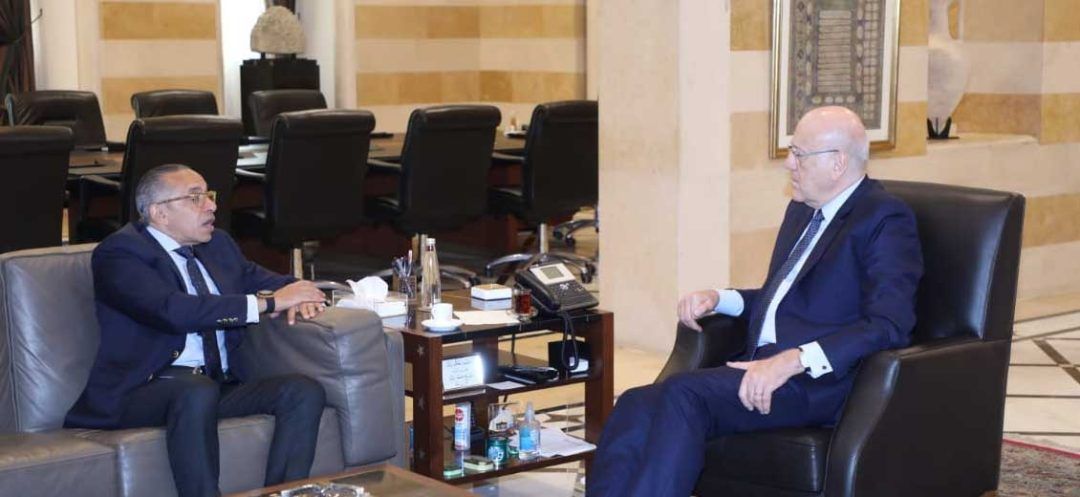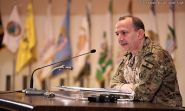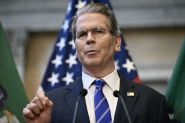
Regarding the Quintet meeting scheduled for September 14, it seems that the Lebanese should not expect any major changes regarding the presidential issue. At least, this is the impression emanating from political circles, particularly within the Lebanese Forces (LF), whose leader, Samir Geagea, met on Tuesday with the Egyptian Ambassador to Lebanon, Alaa Moussa.
As part of a tour of political leaders that he has been conducting for about a week, ahead of the upcoming Quintet meeting — which includes Saudi Arabia, the United States, France, Qatar, and Egypt — Moussa stressed from Meerab, the seat of LF leader Samir Geagea, the need for the main political forces in power "to interact to get Lebanon out of the presidential deadlock."
He noted that he had observed several "positive points" during his tour, "though a few, could lead to unlocking the presidential issue." According to him, "consultation and dialogue are the basis of any political process," and "the mechanisms of consultation and dialogue are essential elements that must be agreed upon to enable the election of a new head of state."
It should be noted that Lebanon has been without a president since former President Michel Aoun's term ended on October 31, 2022.
"It is precisely these consultation mechanisms that need to be focused on," Richard Kouyoumjian, former minister and head of external relations of the LF, and Charles Jabbour, head of communications for the party, explained to This is Beirut.
"We reiterated our stance during our meeting with the Egyptian ambassador. We will not, under any circumstances, accept the call for dialogue in the form proposed by the Speaker of Parliament, Nabih Berri," they insisted, considering that this approach goes against the Constitution. The head of the legislature continues to hold on to his position: a dialogue he would chair prior to any call for a parliamentary session aimed at electing a president.
"We do not oppose dialogue or consultations. However, according to the texts provided by the Constitution, Berri should call for a new parliamentary electoral session, after which we declare ourselves ready to participate in consultation meetings," stated Kouyoumjian, who fears that conditioning the election on holding a dialogue could set a precedent. "We are still, unfortunately, at square one, which prevents us from hoping for any breakthrough on this front," he added.
However, according to the Egyptian ambassador, "to move things forward and create a positive environment through which we can make progress, it is necessary not to focus on the obstructive elements, but rather to emphasize the common points." He added that he is convinced that "dialogue and consultation will inevitably lead to a result that allows us to overcome many obstacles and present the name of one, two, or three candidates capable of leading the country."
During his recent visits to Lebanon, French presidential envoy, Jean-Yves Le Drian, managed to promote the idea of choosing a compromise figure who could be acceptable to all parties. This idea was proposed to break the deadlock, as Hezbollah and the Amal movement remain steadfast in their choice of their candidate, the head of the Marada party, Sleiman Frangieh.
Regarding the Quintet’s role, Moussa noted that the group "has never stopped working to achieve a breakthrough, but recently, efforts have been more focused on calming the situation in the region and avoiding an expansion of the conflict." "Now that we are witnessing a relative return to calm, we can again focus our efforts on the presidential issue," he continued, hoping that the parties in Lebanon share this conviction, "especially since the impact of the war in Gaza must be separated from the process of electing a president in Lebanon."
Moussa at the Grand Serail
The Egyptian ambassador also met on Wednesday with Caretaker Prime Minister Najib Mikati. He plans to visit Berri on Friday after he met last week the head of Hezbollah’s Loyalty to the Resistance parliamentary bloc, Mohammad Raad.
Having informed the caretaker prime minister of the "measures that the Quintet intends to take starting next week to provide a solution to the presidential issue," Moussa indicated that over the past few months, "the situation in southern Lebanon has been a priority, but it is now urgent to focus on the presidential issue." In this regard, he announced that "more initiatives from the Quintet and Lebanese political forces should soon emerge." The overall evolution of negotiations on a ceasefire in Gaza, as well as the role played by Egypt and various mediators, were also discussed during the meeting.
Today, the entire debate revolves around the mechanisms to be adopted for holding the election: a dialogue preceding the call for an electoral session or vice versa? While the Quintet refrains from getting bogged down in such "formalities," at a time when the laws are clear, attention is turning to southern Lebanon, where danger looms following growing threats from Israeli Prime Minister Benjamin Netanyahu against Hezbollah.
As part of a tour of political leaders that he has been conducting for about a week, ahead of the upcoming Quintet meeting — which includes Saudi Arabia, the United States, France, Qatar, and Egypt — Moussa stressed from Meerab, the seat of LF leader Samir Geagea, the need for the main political forces in power "to interact to get Lebanon out of the presidential deadlock."
He noted that he had observed several "positive points" during his tour, "though a few, could lead to unlocking the presidential issue." According to him, "consultation and dialogue are the basis of any political process," and "the mechanisms of consultation and dialogue are essential elements that must be agreed upon to enable the election of a new head of state."
It should be noted that Lebanon has been without a president since former President Michel Aoun's term ended on October 31, 2022.
"It is precisely these consultation mechanisms that need to be focused on," Richard Kouyoumjian, former minister and head of external relations of the LF, and Charles Jabbour, head of communications for the party, explained to This is Beirut.
"We reiterated our stance during our meeting with the Egyptian ambassador. We will not, under any circumstances, accept the call for dialogue in the form proposed by the Speaker of Parliament, Nabih Berri," they insisted, considering that this approach goes against the Constitution. The head of the legislature continues to hold on to his position: a dialogue he would chair prior to any call for a parliamentary session aimed at electing a president.
"We do not oppose dialogue or consultations. However, according to the texts provided by the Constitution, Berri should call for a new parliamentary electoral session, after which we declare ourselves ready to participate in consultation meetings," stated Kouyoumjian, who fears that conditioning the election on holding a dialogue could set a precedent. "We are still, unfortunately, at square one, which prevents us from hoping for any breakthrough on this front," he added.
However, according to the Egyptian ambassador, "to move things forward and create a positive environment through which we can make progress, it is necessary not to focus on the obstructive elements, but rather to emphasize the common points." He added that he is convinced that "dialogue and consultation will inevitably lead to a result that allows us to overcome many obstacles and present the name of one, two, or three candidates capable of leading the country."
During his recent visits to Lebanon, French presidential envoy, Jean-Yves Le Drian, managed to promote the idea of choosing a compromise figure who could be acceptable to all parties. This idea was proposed to break the deadlock, as Hezbollah and the Amal movement remain steadfast in their choice of their candidate, the head of the Marada party, Sleiman Frangieh.
Regarding the Quintet’s role, Moussa noted that the group "has never stopped working to achieve a breakthrough, but recently, efforts have been more focused on calming the situation in the region and avoiding an expansion of the conflict." "Now that we are witnessing a relative return to calm, we can again focus our efforts on the presidential issue," he continued, hoping that the parties in Lebanon share this conviction, "especially since the impact of the war in Gaza must be separated from the process of electing a president in Lebanon."
Moussa at the Grand Serail
The Egyptian ambassador also met on Wednesday with Caretaker Prime Minister Najib Mikati. He plans to visit Berri on Friday after he met last week the head of Hezbollah’s Loyalty to the Resistance parliamentary bloc, Mohammad Raad.
Having informed the caretaker prime minister of the "measures that the Quintet intends to take starting next week to provide a solution to the presidential issue," Moussa indicated that over the past few months, "the situation in southern Lebanon has been a priority, but it is now urgent to focus on the presidential issue." In this regard, he announced that "more initiatives from the Quintet and Lebanese political forces should soon emerge." The overall evolution of negotiations on a ceasefire in Gaza, as well as the role played by Egypt and various mediators, were also discussed during the meeting.
Today, the entire debate revolves around the mechanisms to be adopted for holding the election: a dialogue preceding the call for an electoral session or vice versa? While the Quintet refrains from getting bogged down in such "formalities," at a time when the laws are clear, attention is turning to southern Lebanon, where danger looms following growing threats from Israeli Prime Minister Benjamin Netanyahu against Hezbollah.
Read more



Comments